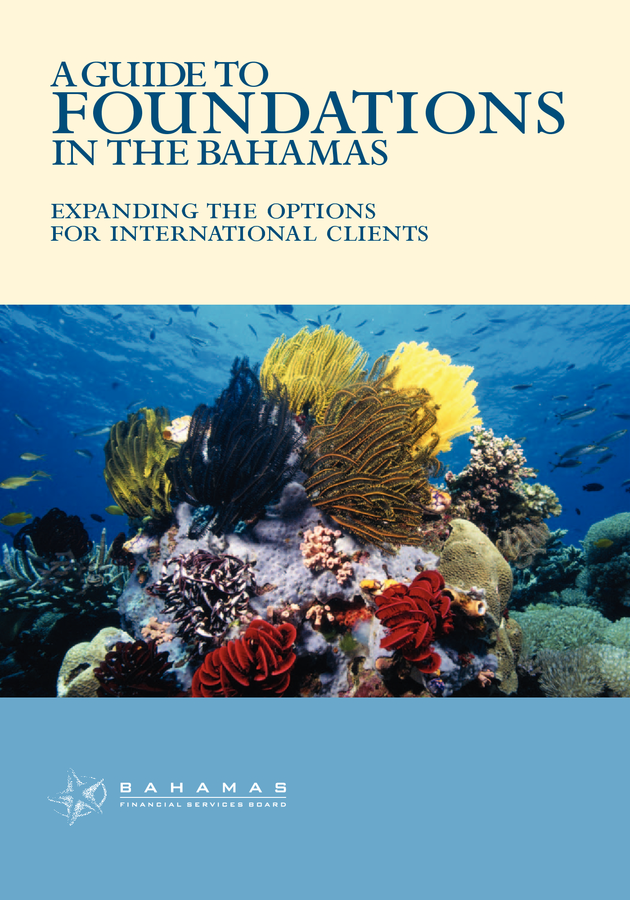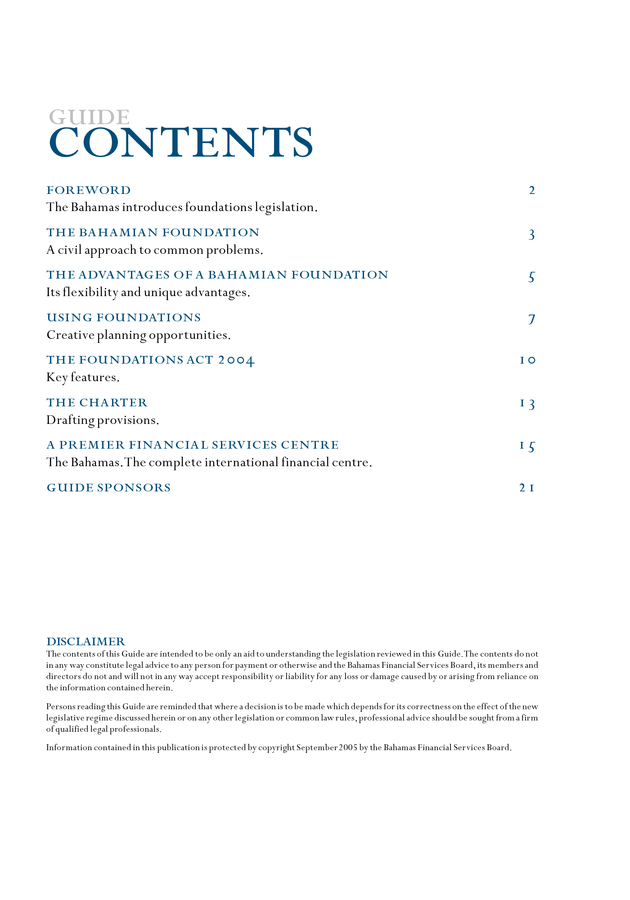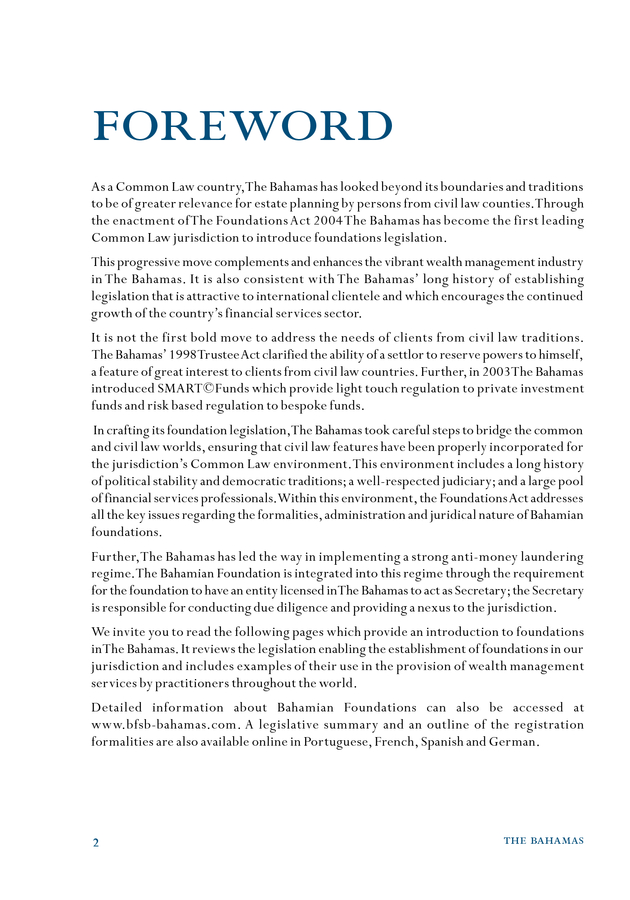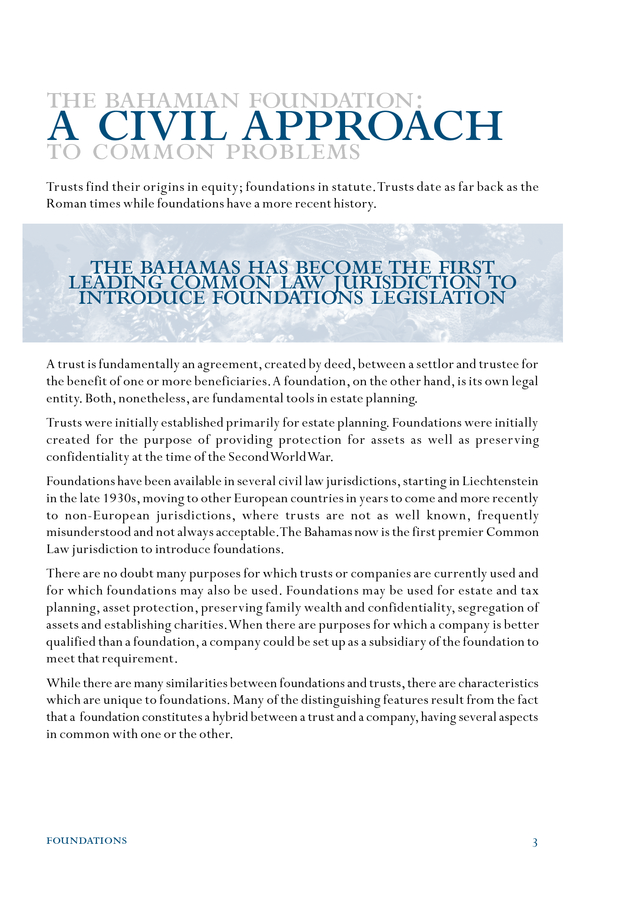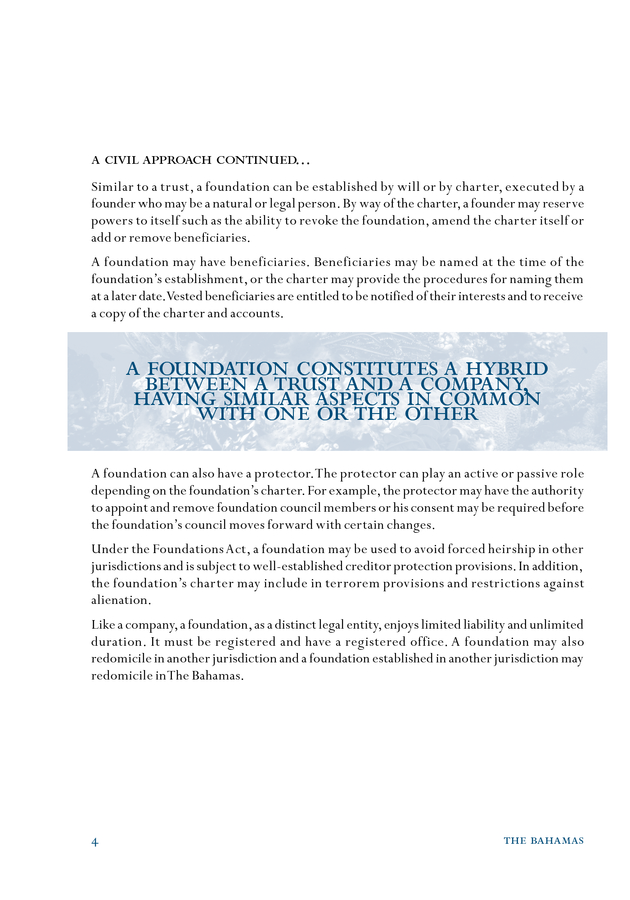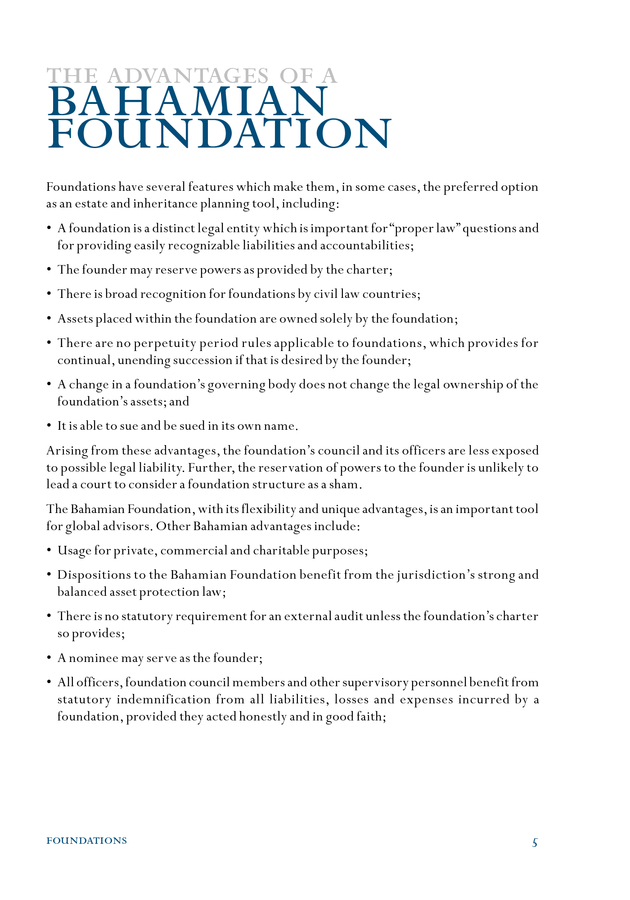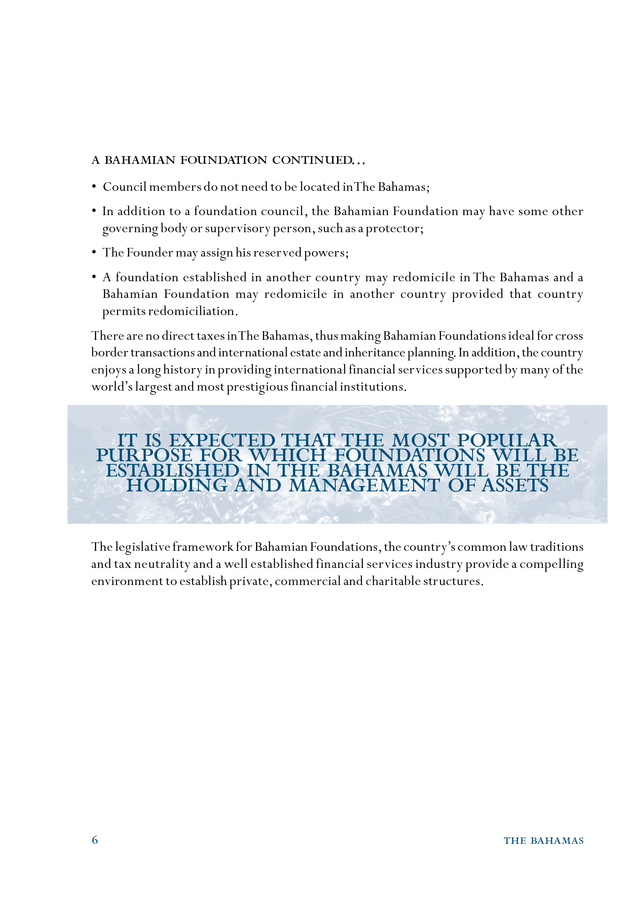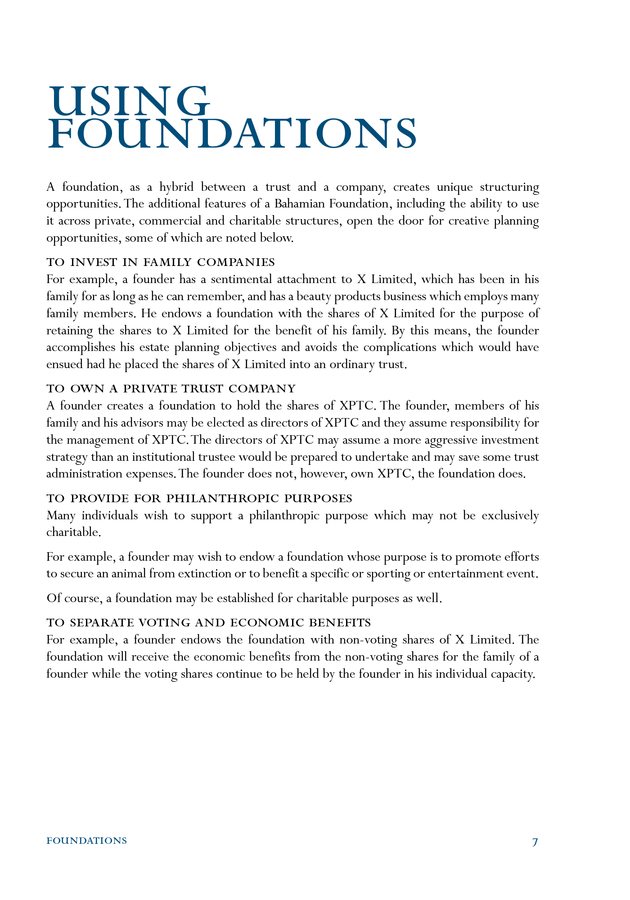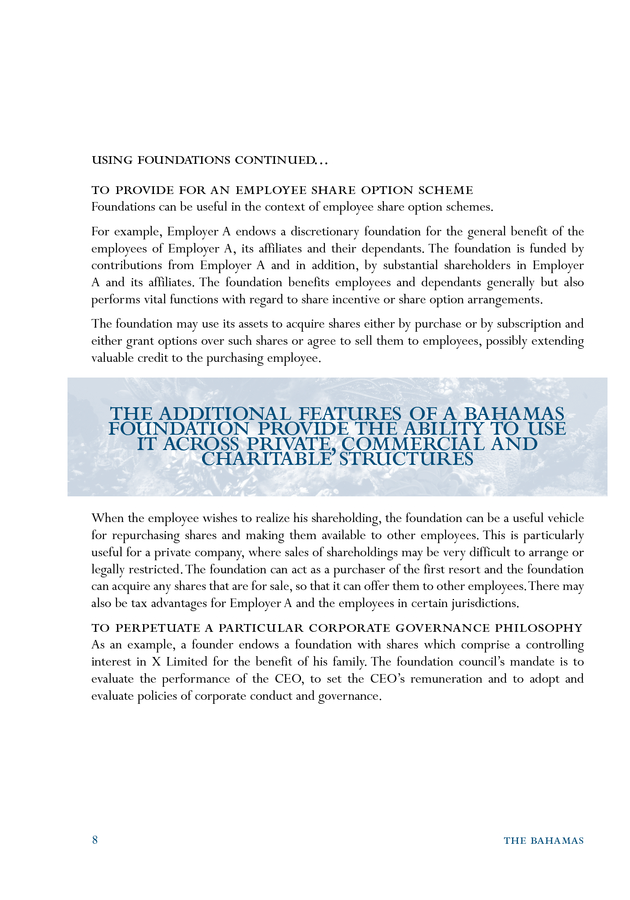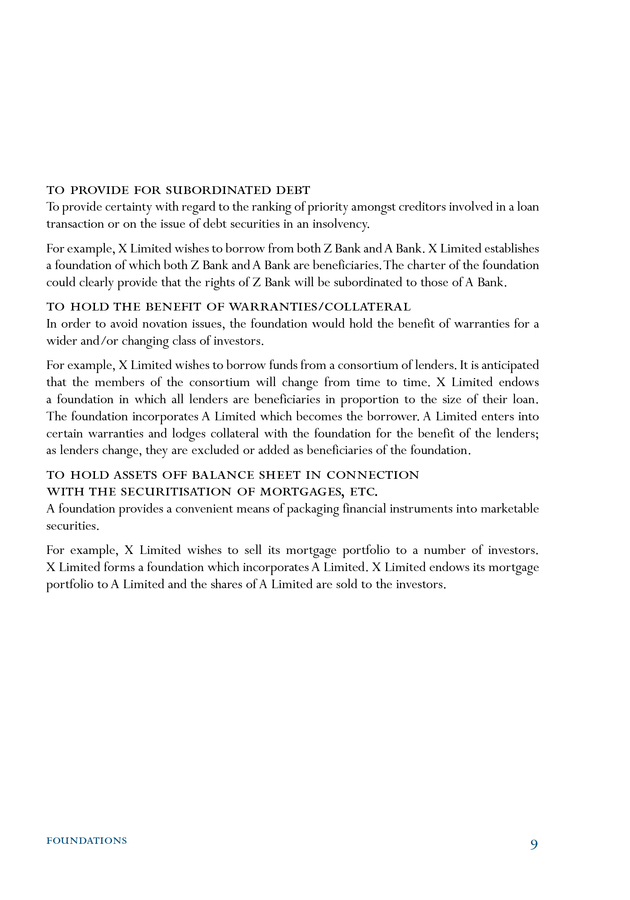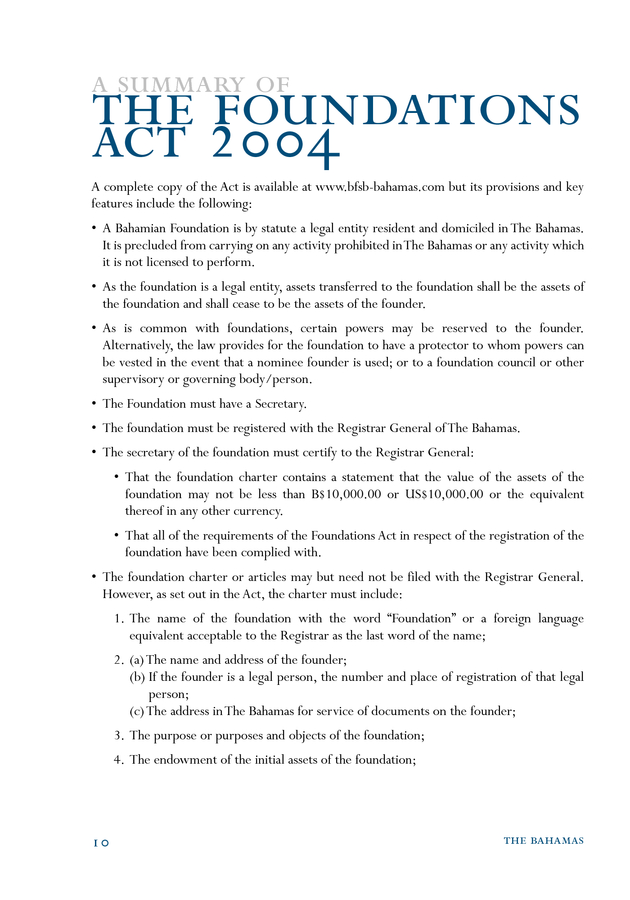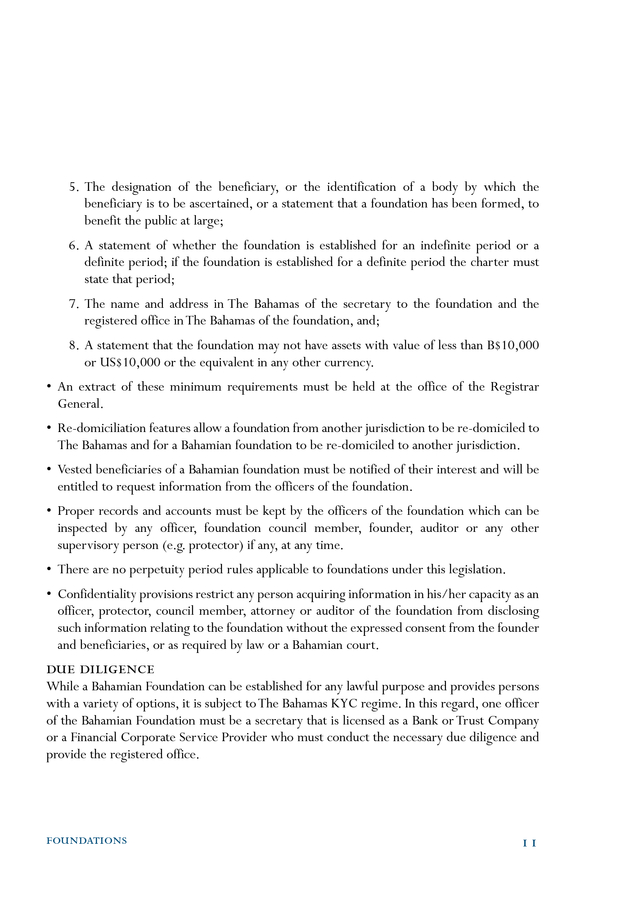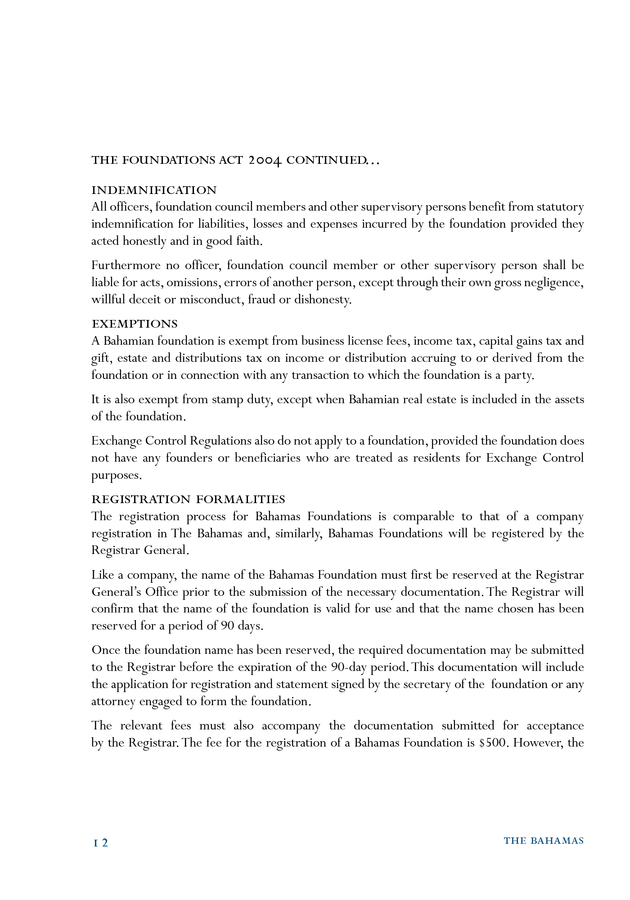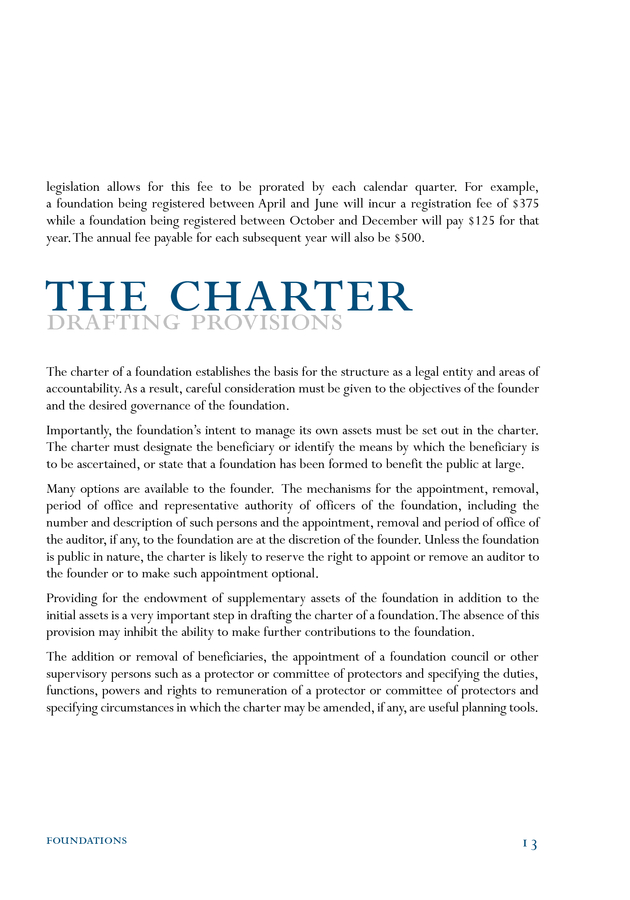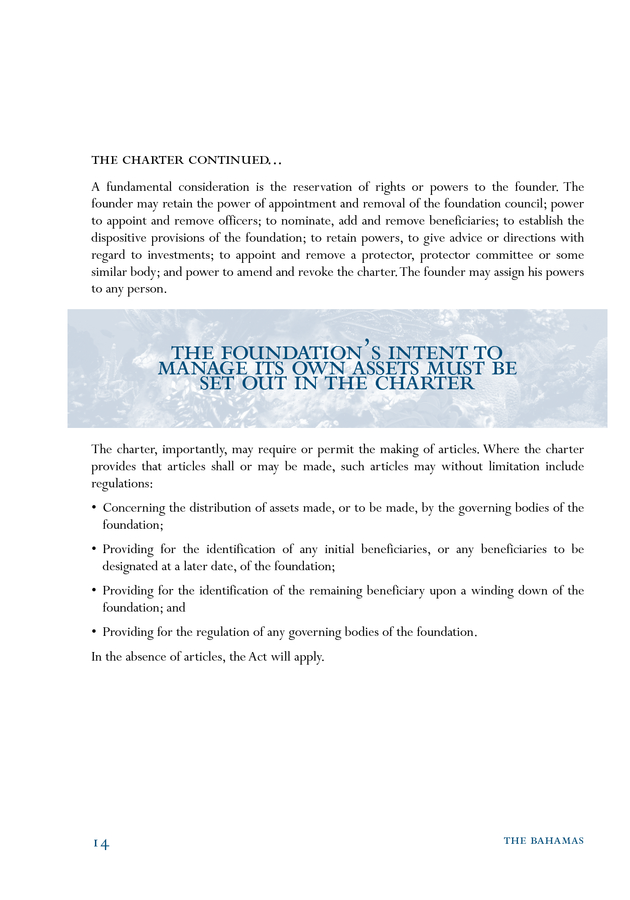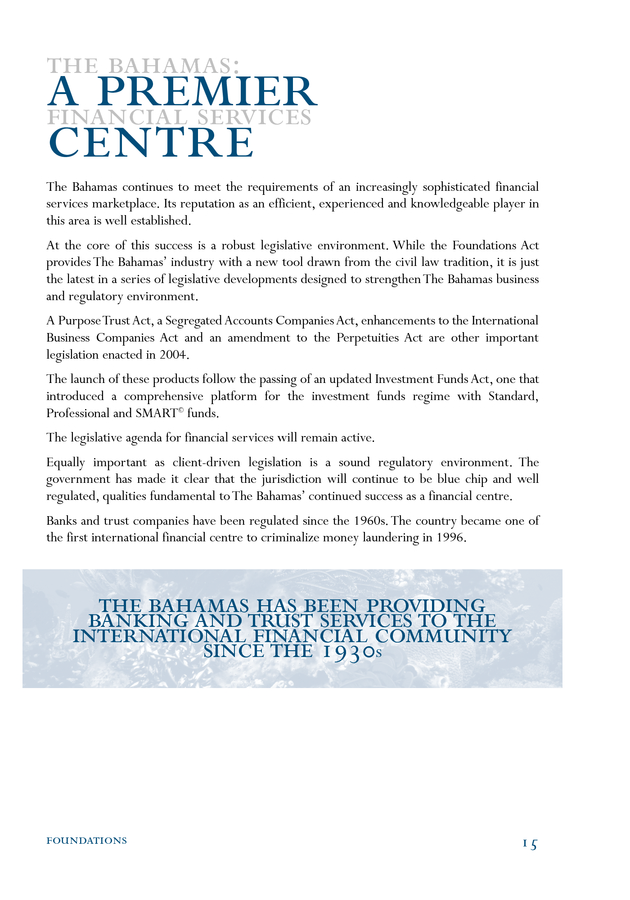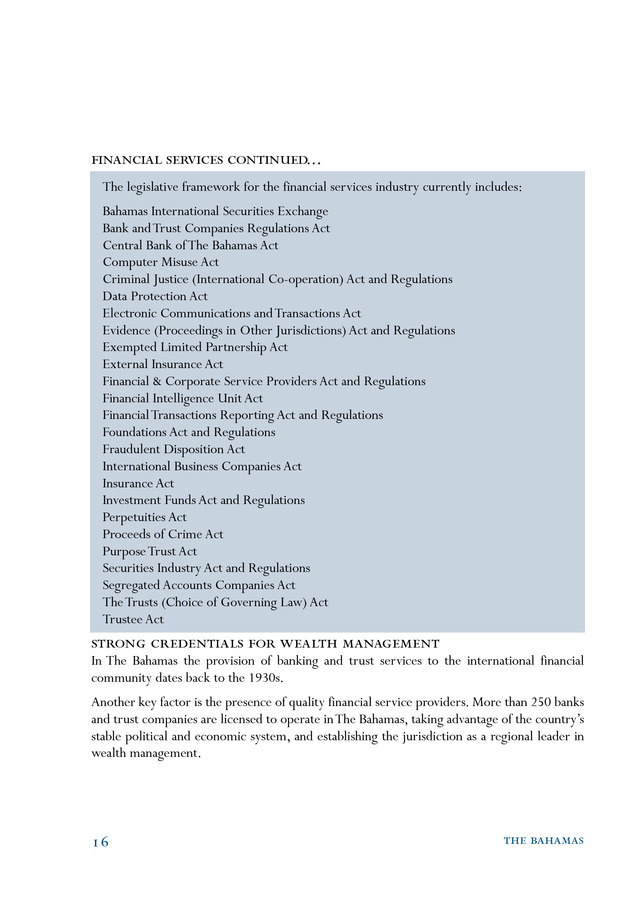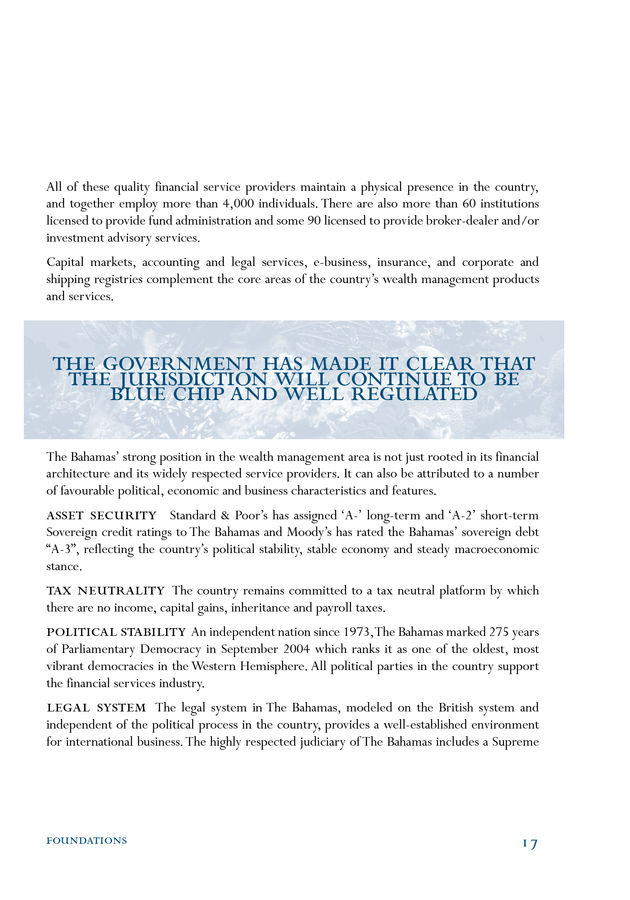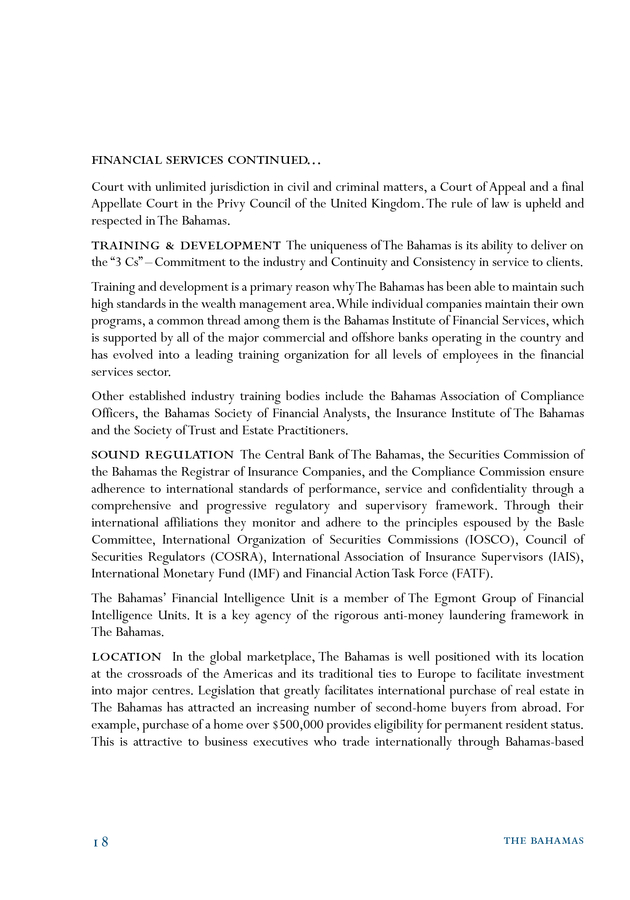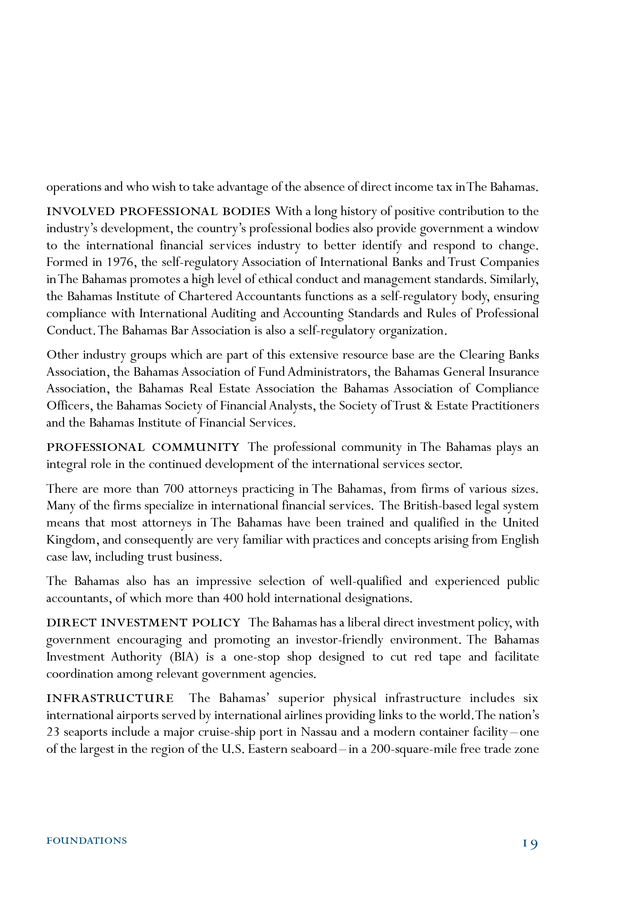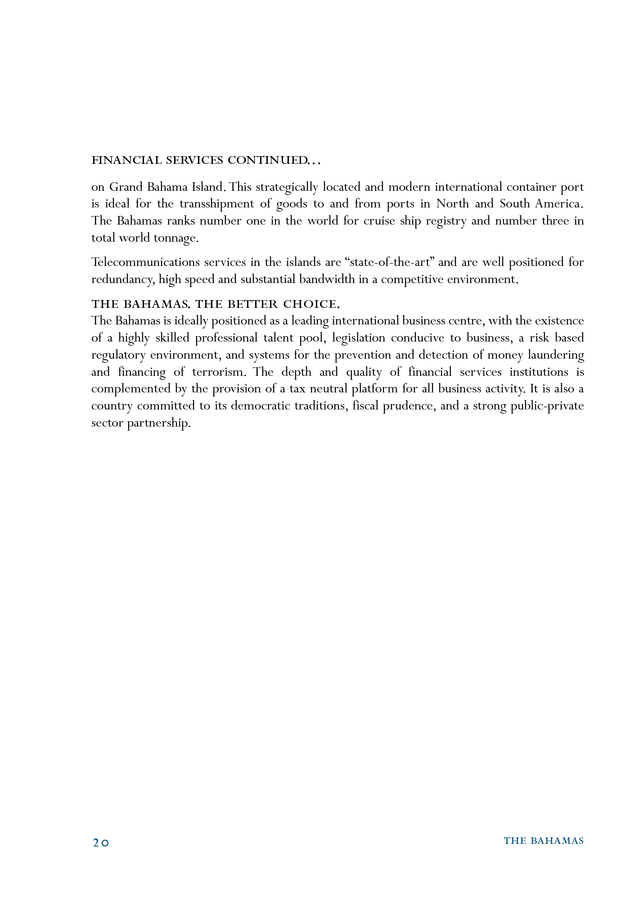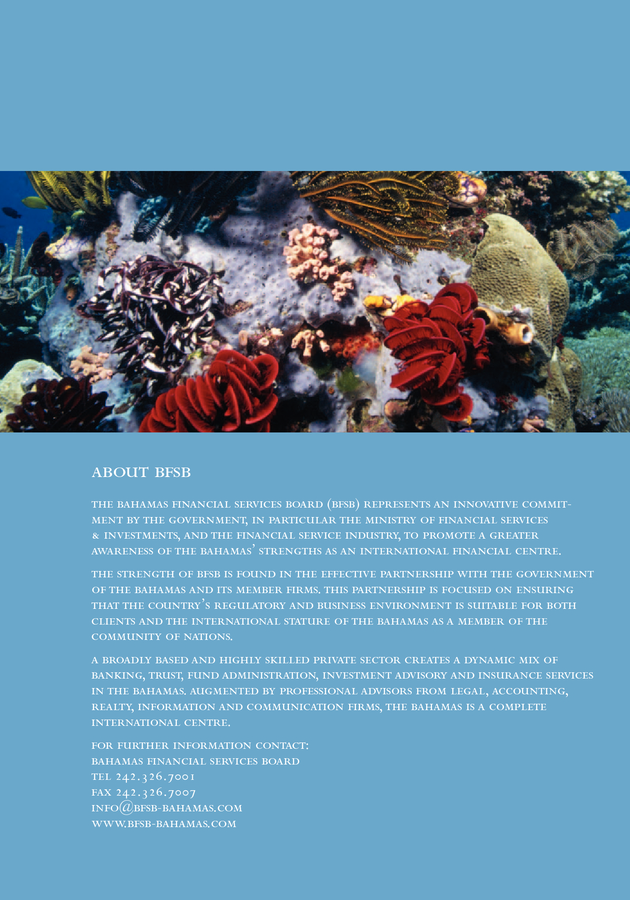




1) aguideto inthebahamas foundations expanding the options for international clients
2) Dynamic, expansive and teeming with life, the reefs surrounding The Islands of The Bahamas mirror the vibrant environment that is today’s Bahamas financial services industry.
3) guide contents foreword 2 The Bahamas introduces foundations legislation. the bahamian foundation 3 A civil approach to common problems. the advantages of a bahamian foundation 5 Its flexibility and unique advantages. using foundations 7 Creative planning opportunities. the foundations act 2004 10 Key features. the charter 13 Drafting provisions. a premier financial services centre 15 The Bahamas.The complete international financial centre. guide sponsors 21 disclaimer The contents of this Guide are intended to be only an aid to understanding the legislation reviewed in this Guide.The contents do not in any way constitute legal advice to any person for payment or otherwise and the Bahamas Financial Services Board, its members and directors do not and will not in any way accept responsibility or liability for any loss or damage caused by or arising from reliance on the information contained herein. Persons reading this Guide are reminded that where a decision is to be made which depends for its correctness on the effect of the new legislative regime discussed herein or on any other legislation or common law rules, professional advice should be sought from a firm of qualified legal professionals. Information contained in this publication is protected by copyright September2005 by the Bahamas Financial Services Board.
4) foreword As a Common Law country,The Bahamas has looked beyond its boundaries and traditions to be of greater relevance for estate planning by persons from civil law counties.Through the enactment of The Foundations Act 2004 The Bahamas has become the first leading Common Law jurisdiction to introduce foundations legislation. This progressive move complements and enhances the vibrant wealth management industry in The Bahamas. It is also consistent with The Bahamas’ long history of establishing legislation that is attractive to international clientele and which encourages the continued growth of the country’s financial services sector. It is not the first bold move to address the needs of clients from civil law traditions. The Bahamas’ 1998 Trustee Act clarified the ability of a settlor to reserve powers to himself, a feature of great interest to clients from civil law countries. Further, in 2003 The Bahamas introduced SMART©Funds which provide light touch regulation to private investment funds and risk based regulation to bespoke funds. In crafting its foundation legislation,The Bahamas took careful steps to bridge the common and civil law worlds, ensuring that civil law features have been properly incorporated for the jurisdiction’s Common Law environment.This environment includes a long history of political stability and democratic traditions; a well-respected judiciary; and a large pool of financial services professionals.Within this environment, the Foundations Act addresses all the key issues regarding the formalities, administration and juridical nature of Bahamian foundations. Further,The Bahamas has led the way in implementing a strong anti-money laundering regime.The Bahamian Foundation is integrated into this regime through the requirement for the foundation to have an entity licensed inThe Bahamas to act as Secretary; the Secretary is responsible for conducting due diligence and providing a nexus to the jurisdiction. We invite you to read the following pages which provide an introduction to foundations in The Bahamas. It reviews the legislation enabling the establishment of foundations in our jurisdiction and includes examples of their use in the provision of wealth management services by practitioners throughout the world. Detailed information about Bahamian Foundations can also be accessed at www.bfsb-bahamas.com. A legislative summary and an outline of the registration formalities are also available online in Portuguese, French, Spanish and German. 2 the bahamas
5) the bahamian foundation: to common problems a civil approach Trusts find their origins in equity; foundations in statute.Trusts date as far back as the Roman times while foundations have a more recent history. the bahamas has become the first leading common law jurisdiction to introduce foundations legislation A trust is fundamentally an agreement, created by deed, between a settlor and trustee for the benefit of one or more beneficiaries.A foundation, on the other hand, is its own legal entity. Both, nonetheless, are fundamental tools in estate planning. Trusts were initially established primarily for estate planning. Foundations were initially created for the purpose of providing protection for assets as well as preserving confidentiality at the time of the Second World War. Foundations have been available in several civil law jurisdictions, starting in Liechtenstein in the late 1930s, moving to other European countries in years to come and more recently to non-European jurisdictions, where trusts are not as well known, frequently misunderstood and not always acceptable.The Bahamas now is the first premier Common Law jurisdiction to introduce foundations. There are no doubt many purposes for which trusts or companies are currently used and for which foundations may also be used. Foundations may be used for estate and tax planning, asset protection, preserving family wealth and confidentiality, segregation of assets and establishing charities.When there are purposes for which a company is better qualified than a foundation, a company could be set up as a subsidiary of the foundation to meet that requirement. While there are many similarities between foundations and trusts, there are characteristics which are unique to foundations. Many of the distinguishing features result from the fact that a foundation constitutes a hybrid between a trust and a company, having several aspects in common with one or the other. foundations 3
6) a civil approach continued... Similar to a trust, a foundation can be established by will or by charter, executed by a founder who may be a natural or legal person. By way of the charter, a founder may reserve powers to itself such as the ability to revoke the foundation, amend the charter itself or add or remove beneficiaries. A foundation may have beneficiaries. Beneficiaries may be named at the time of the foundation’s establishment, or the charter may provide the procedures for naming them at a later date.Vested beneficiaries are entitled to be notified of their interests and to receive a copy of the charter and accounts. a between a trust and a company, foundation constitutes a hybrid having similar aspects other with one or the in common A foundation can also have a protector.The protector can play an active or passive role depending on the foundation’s charter. For example, the protector may have the authority to appoint and remove foundation council members or his consent may be required before the foundation’s council moves forward with certain changes. Under the Foundations Act, a foundation may be used to avoid forced heirship in other jurisdictions and is subject to well-established creditor protection provisions. In addition, the foundation’s charter may include in terrorem provisions and restrictions against alienation. Like a company, a foundation, as a distinct legal entity, enjoys limited liability and unlimited duration. It must be registered and have a registered office. A foundation may also redomicile in another jurisdiction and a foundation established in another jurisdiction may redomicile in The Bahamas. 4 the bahamas
7) the advantages of a bahamian foundation Foundations have several features which make them, in some cases, the preferred option as an estate and inheritance planning tool, including: • A foundation is a distinct legal entity which is important for “proper law” questions and for providing easily recognizable liabilities and accountabilities; • The founder may reserve powers as provided by the charter; • There is broad recognition for foundations by civil law countries; • Assets placed within the foundation are owned solely by the foundation; • There are no perpetuity period rules applicable to foundations, which provides for continual, unending succession if that is desired by the founder; • A change in a foundation’s governing body does not change the legal ownership of the foundation’s assets; and • It is able to sue and be sued in its own name. Arising from these advantages, the foundation’s council and its officers are less exposed to possible legal liability. Further, the reservation of powers to the founder is unlikely to lead a court to consider a foundation structure as a sham. The Bahamian Foundation, with its flexibility and unique advantages, is an important tool for global advisors. Other Bahamian advantages include: • Usage for private, commercial and charitable purposes; • Dispositions to the Bahamian Foundation benefit from the jurisdiction’s strong and balanced asset protection law; • There is no statutory requirement for an external audit unless the foundation’s charter so provides; • A nominee may serve as the founder; • All officers, foundation council members and other supervisory personnel benefit from statutory indemnification from all liabilities, losses and expenses incurred by a foundation, provided they acted honestly and in good faith; foundations 5
8) a bahamian foundation continued... • Council members do not need to be located in The Bahamas; • In addition to a foundation council, the Bahamian Foundation may have some other governing body or supervisory person, such as a protector; • The Founder may assign his reserved powers; • A foundation established in another country may redomicile in The Bahamas and a Bahamian Foundation may redomicile in another country provided that country permits redomiciliation. There are no direct taxes inThe Bahamas, thus making Bahamian Foundations ideal for cross border transactions and international estate and inheritance planning.In addition,the country enjoys a long history in providing international financial services supported by many of the world’s largest and most prestigious financial institutions. it is expected thatfoundations purpose for in the bahamas will will be which the most popular establishedand management of assets be the holding The legislative framework for Bahamian Foundations, the country’s common law traditions and tax neutrality and a well established financial services industry provide a compelling environment to establish private, commercial and charitable structures. 6 the bahamas
9) using foundations A foundation, as a hybrid between a trust and a company, creates unique structuring opportunities. The additional features of a Bahamian Foundation, including the ability to use it across private, commercial and charitable structures, open the door for creative planning opportunities, some of which are noted below. to invest in family companies For example, a founder has a sentimental attachment to X Limited, which has been in his family for as long as he can remember, and has a beauty products business which employs many family members. He endows a foundation with the shares of X Limited for the purpose of retaining the shares to X Limited for the benefit of his family. By this means, the founder accomplishes his estate planning objectives and avoids the complications which would have ensued had he placed the shares of X Limited into an ordinary trust. to own a private trust company A founder creates a foundation to hold the shares of XPTC. The founder, members of his family and his advisors may be elected as directors of XPTC and they assume responsibility for the management of XPTC.The directors of XPTC may assume a more aggressive investment strategy than an institutional trustee would be prepared to undertake and may save some trust administration expenses.The founder does not, however, own XPTC, the foundation does. to provide for philanthropic purposes Many individuals wish to support a philanthropic purpose which may not be exclusively charitable. For example, a founder may wish to endow a foundation whose purpose is to promote efforts to secure an animal from extinction or to benefit a specific or sporting or entertainment event. Of course, a foundation may be established for charitable purposes as well. to separate voting and economic benefits For example, a founder endows the foundation with non-voting shares of X Limited. The foundation will receive the economic benefits from the non-voting shares for the family of a founder while the voting shares continue to be held by the founder in his individual capacity. foundations 7
10) using foundations continued... to provide for an employee share option scheme Foundations can be useful in the context of employee share option schemes. For example, Employer A endows a discretionary foundation for the general benefit of the employees of Employer A, its affiliates and their dependants. The foundation is funded by contributions from Employer A and in addition, by substantial shareholders in Employer A and its affiliates. The foundation benefits employees and dependants generally but also performs vital functions with regard to share incentive or share option arrangements. The foundation may use its assets to acquire shares either by purchase or by subscription and either grant options over such shares or agree to sell them to employees, possibly extending valuable credit to the purchasing employee. the additional features ability foundationprivate,commercial to use provide the of a bahamas it across charitable structures and When the employee wishes to realize his shareholding, the foundation can be a useful vehicle for repurchasing shares and making them available to other employees. This is particularly useful for a private company, where sales of shareholdings may be very difficult to arrange or legally restricted.The foundation can act as a purchaser of the first resort and the foundation can acquire any shares that are for sale, so that it can offer them to other employees.There may also be tax advantages for Employer A and the employees in certain jurisdictions. to perpetuate a particular corporate governance philosophy As an example, a founder endows a foundation with shares which comprise a controlling interest in X Limited for the benefit of his family. The foundation council’s mandate is to evaluate the performance of the CEO, to set the CEO’s remuneration and to adopt and evaluate policies of corporate conduct and governance. 8 the bahamas
11) to provide for subordinated debt To provide certainty with regard to the ranking of priority amongst creditors involved in a loan transaction or on the issue of debt securities in an insolvency. For example, X Limited wishes to borrow from both Z Bank and A Bank. X Limited establishes a foundation of which both Z Bank and A Bank are beneficiaries.The charter of the foundation could clearly provide that the rights of Z Bank will be subordinated to those of A Bank. to hold the benefit of warranties/collateral In order to avoid novation issues, the foundation would hold the benefit of warranties for a wider and/or changing class of investors. For example, X Limited wishes to borrow funds from a consortium of lenders. It is anticipated that the members of the consortium will change from time to time. X Limited endows a foundation in which all lenders are beneficiaries in proportion to the size of their loan. The foundation incorporates A Limited which becomes the borrower. A Limited enters into certain warranties and lodges collateral with the foundation for the benefit of the lenders; as lenders change, they are excluded or added as beneficiaries of the foundation. to hold assets off balance sheet in connection with the securitisation of mortgages, etc. A foundation provides a convenient means of packaging financial instruments into marketable securities. For example, X Limited wishes to sell its mortgage portfolio to a number of investors. X Limited forms a foundation which incorporates A Limited. X Limited endows its mortgage portfolio to A Limited and the shares of A Limited are sold to the investors. foundations 9
12) a summary of the 2004 foundations act A complete copy of the Act is available at www.bfsb-bahamas.com but its provisions and key features include the following: • A Bahamian Foundation is by statute a legal entity resident and domiciled in The Bahamas. It is precluded from carrying on any activity prohibited in The Bahamas or any activity which it is not licensed to perform. • As the foundation is a legal entity, assets transferred to the foundation shall be the assets of the foundation and shall cease to be the assets of the founder. • As is common with foundations, certain powers may be reserved to the founder. Alternatively, the law provides for the foundation to have a protector to whom powers can be vested in the event that a nominee founder is used; or to a foundation council or other supervisory or governing body/person. • The Foundation must have a Secretary. • The foundation must be registered with the Registrar General of The Bahamas. • The secretary of the foundation must certify to the Registrar General: • That the foundation charter contains a statement that the value of the assets of the foundation may not be less than B$10,000.00 or US$10,000.00 or the equivalent thereof in any other currency. • That all of the requirements of the Foundations Act in respect of the registration of the foundation have been complied with. • The foundation charter or articles may but need not be filed with the Registrar General. However, as set out in the Act, the charter must include: 1. The name of the foundation with the word “Foundation” or a foreign language equivalent acceptable to the Registrar as the last word of the name; 2. (a) The name and address of the founder; (b) If the founder is a legal person, the number and place of registration of that legal person; (c) The address in The Bahamas for service of documents on the founder; 3. The purpose or purposes and objects of the foundation; 4. The endowment of the initial assets of the foundation; 10 the bahamas
13) 5. The designation of the beneficiary, or the identification of a body by which the beneficiary is to be ascertained, or a statement that a foundation has been formed, to benefit the public at large; 6. A statement of whether the foundation is established for an indefinite period or a definite period; if the foundation is established for a definite period the charter must state that period; 7. The name and address in The Bahamas of the secretary to the foundation and the registered office in The Bahamas of the foundation, and; 8. A statement that the foundation may not have assets with value of less than B$10,000 or US$10,000 or the equivalent in any other currency. • An extract of these minimum requirements must be held at the office of the Registrar General. • Re-domiciliation features allow a foundation from another jurisdiction to be re-domiciled to The Bahamas and for a Bahamian foundation to be re-domiciled to another jurisdiction. • Vested beneficiaries of a Bahamian foundation must be notified of their interest and will be entitled to request information from the officers of the foundation. • Proper records and accounts must be kept by the officers of the foundation which can be inspected by any officer, foundation council member, founder, auditor or any other supervisory person (e.g. protector) if any, at any time. • There are no perpetuity period rules applicable to foundations under this legislation. • Confidentiality provisions restrict any person acquiring information in his/her capacity as an officer, protector, council member, attorney or auditor of the foundation from disclosing such information relating to the foundation without the expressed consent from the founder and beneficiaries, or as required by law or a Bahamian court. due diligence While a Bahamian Foundation can be established for any lawful purpose and provides persons with a variety of options, it is subject to The Bahamas KYC regime. In this regard, one officer of the Bahamian Foundation must be a secretary that is licensed as a Bank or Trust Company or a Financial Corporate Service Provider who must conduct the necessary due diligence and provide the registered office. foundations 11
14) the foundations act 2004 continued... indemnification All officers, foundation council members and other supervisory persons benefit from statutory indemnification for liabilities, losses and expenses incurred by the foundation provided they acted honestly and in good faith. Furthermore no officer, foundation council member or other supervisory person shall be liable for acts, omissions, errors of another person, except through their own gross negligence, willful deceit or misconduct, fraud or dishonesty. exemptions A Bahamian foundation is exempt from business license fees, income tax, capital gains tax and gift, estate and distributions tax on income or distribution accruing to or derived from the foundation or in connection with any transaction to which the foundation is a party. It is also exempt from stamp duty, except when Bahamian real estate is included in the assets of the foundation. Exchange Control Regulations also do not apply to a foundation, provided the foundation does not have any founders or beneficiaries who are treated as residents for Exchange Control purposes. registration formalities The registration process for Bahamas Foundations is comparable to that of a company registration in The Bahamas and, similarly, Bahamas Foundations will be registered by the Registrar General. Like a company, the name of the Bahamas Foundation must first be reserved at the Registrar General’s Office prior to the submission of the necessary documentation. The Registrar will confirm that the name of the foundation is valid for use and that the name chosen has been reserved for a period of 90 days. Once the foundation name has been reserved, the required documentation may be submitted to the Registrar before the expiration of the 90-day period.This documentation will include the application for registration and statement signed by the secretary of the foundation or any attorney engaged to form the foundation. The relevant fees must also accompany the documentation submitted for acceptance by the Registrar.The fee for the registration of a Bahamas Foundation is $500. However, the 12 the bahamas
15) legislation allows for this fee to be prorated by each calendar quarter. For example, a foundation being registered between April and June will incur a registration fee of $375 while a foundation being registered between October and December will pay $125 for that year.The annual fee payable for each subsequent year will also be $500. the charter drafting provisions The charter of a foundation establishes the basis for the structure as a legal entity and areas of accountability.As a result, careful consideration must be given to the objectives of the founder and the desired governance of the foundation. Importantly, the foundation’s intent to manage its own assets must be set out in the charter. The charter must designate the beneficiary or identify the means by which the beneficiary is to be ascertained, or state that a foundation has been formed to benefit the public at large. Many options are available to the founder. The mechanisms for the appointment, removal, period of office and representative authority of officers of the foundation, including the number and description of such persons and the appointment, removal and period of office of the auditor, if any, to the foundation are at the discretion of the founder. Unless the foundation is public in nature, the charter is likely to reserve the right to appoint or remove an auditor to the founder or to make such appointment optional. Providing for the endowment of supplementary assets of the foundation in addition to the initial assets is a very important step in drafting the charter of a foundation.The absence of this provision may inhibit the ability to make further contributions to the foundation. The addition or removal of beneficiaries, the appointment of a foundation council or other supervisory persons such as a protector or committee of protectors and specifying the duties, functions, powers and rights to remuneration of a protector or committee of protectors and specifying circumstances in which the charter may be amended, if any, are useful planning tools. foundations 13
16) the charter continued... A fundamental consideration is the reservation of rights or powers to the founder. The founder may retain the power of appointment and removal of the foundation council; power to appoint and remove officers; to nominate, add and remove beneficiaries; to establish the dispositive provisions of the foundation; to retain powers, to give advice or directions with regard to investments; to appoint and remove a protector, protector committee or some similar body; and power to amend and revoke the charter.The founder may assign his powers to any person. the foundation’s intent to manage its own assets must be set out in the charter The charter, importantly, may require or permit the making of articles. Where the charter provides that articles shall or may be made, such articles may without limitation include regulations: • Concerning the distribution of assets made, or to be made, by the governing bodies of the foundation; • Providing for the identification of any initial beneficiaries, or any beneficiaries to be designated at a later date, of the foundation; • Providing for the identification of the remaining beneficiary upon a winding down of the foundation; and • Providing for the regulation of any governing bodies of the foundation. In the absence of articles, the Act will apply. 14 the bahamas
17) the bahamas: financial services a premier centre The Bahamas continues to meet the requirements of an increasingly sophisticated financial services marketplace. Its reputation as an efficient, experienced and knowledgeable player in this area is well established. At the core of this success is a robust legislative environment. While the Foundations Act provides The Bahamas’ industry with a new tool drawn from the civil law tradition, it is just the latest in a series of legislative developments designed to strengthen The Bahamas business and regulatory environment. A Purpose Trust Act, a Segregated Accounts Companies Act, enhancements to the International Business Companies Act and an amendment to the Perpetuities Act are other important legislation enacted in 2004. The launch of these products follow the passing of an updated Investment Funds Act, one that introduced a comprehensive platform for the investment funds regime with Standard, Professional and SMART© funds. The legislative agenda for financial services will remain active. Equally important as client-driven legislation is a sound regulatory environment. The government has made it clear that the jurisdiction will continue to be blue chip and well regulated, qualities fundamental to The Bahamas’ continued success as a financial centre. Banks and trust companies have been regulated since the 1960s. The country became one of the first international financial centre to criminalize money laundering in 1996. the bahamas has been providing banking and trust services to the international financial community since the 1930s foundations 15
18) financial services continued... The legislative framework for the financial services industry currently includes: Bahamas International Securities Exchange Bank and Trust Companies Regulations Act Central Bank of The Bahamas Act Computer Misuse Act Criminal Justice (International Co-operation) Act and Regulations Data Protection Act Electronic Communications and Transactions Act Evidence (Proceedings in Other Jurisdictions) Act and Regulations Exempted Limited Partnership Act External Insurance Act Financial & Corporate Service Providers Act and Regulations Financial Intelligence Unit Act Financial Transactions Reporting Act and Regulations Foundations Act and Regulations Fraudulent Disposition Act International Business Companies Act Insurance Act Investment Funds Act and Regulations Perpetuities Act Proceeds of Crime Act Purpose Trust Act Securities Industry Act and Regulations Segregated Accounts Companies Act The Trusts (Choice of Governing Law) Act Trustee Act strong credentials for wealth management In The Bahamas the provision of banking and trust services to the international financial community dates back to the 1930s. Another key factor is the presence of quality financial service providers. More than 250 banks and trust companies are licensed to operate in The Bahamas, taking advantage of the country’s stable political and economic system, and establishing the jurisdiction as a regional leader in wealth management. 16 the bahamas
19) All of these quality financial service providers maintain a physical presence in the country, and together employ more than 4,000 individuals. There are also more than 60 institutions licensed to provide fund administration and some 90 licensed to provide broker-dealer and/or investment advisory services. Capital markets, accounting and legal services, e-business, insurance, and corporate and shipping registries complement the core areas of the country’s wealth management products and services. the government has made it clear that theblue chip andwill continue to be jurisdiction well regulated The Bahamas’ strong position in the wealth management area is not just rooted in its financial architecture and its widely respected service providers. It can also be attributed to a number of favourable political, economic and business characteristics and features. asset security Standard & Poor’s has assigned ‘A-’ long-term and ‘A-2’ short-term Sovereign credit ratings to The Bahamas and Moody’s has rated the Bahamas’ sovereign debt “A-3”, reflecting the country’s political stability, stable economy and steady macroeconomic stance. tax neutrality The country remains committed to a tax neutral platform by which there are no income, capital gains, inheritance and payroll taxes. political stability An independent nation since 1973,The Bahamas marked 275 years of Parliamentary Democracy in September 2004 which ranks it as one of the oldest, most vibrant democracies in the Western Hemisphere. All political parties in the country support the financial services industry. legal system The legal system in The Bahamas, modeled on the British system and independent of the political process in the country, provides a well-established environment for international business.The highly respected judiciary of The Bahamas includes a Supreme foundations 17
20) financial services continued... Court with unlimited jurisdiction in civil and criminal matters, a Court of Appeal and a final Appellate Court in the Privy Council of the United Kingdom.The rule of law is upheld and respected in The Bahamas. training & development The uniqueness of The Bahamas is its ability to deliver on the “3 Cs” – Commitment to the industry and Continuity and Consistency in service to clients. Training and development is a primary reason why The Bahamas has been able to maintain such high standards in the wealth management area.While individual companies maintain their own programs, a common thread among them is the Bahamas Institute of Financial Services, which is supported by all of the major commercial and offshore banks operating in the country and has evolved into a leading training organization for all levels of employees in the financial services sector. Other established industry training bodies include the Bahamas Association of Compliance Officers, the Bahamas Society of Financial Analysts, the Insurance Institute of The Bahamas and the Society of Trust and Estate Practitioners. sound regulation The Central Bank of The Bahamas, the Securities Commission of the Bahamas the Registrar of Insurance Companies, and the Compliance Commission ensure adherence to international standards of performance, service and confidentiality through a comprehensive and progressive regulatory and supervisory framework. Through their international affiliations they monitor and adhere to the principles espoused by the Basle Committee, International Organization of Securities Commissions (IOSCO), Council of Securities Regulators (COSRA), International Association of Insurance Supervisors (IAIS), International Monetary Fund (IMF) and Financial Action Task Force (FATF). The Bahamas’ Financial Intelligence Unit is a member of The Egmont Group of Financial Intelligence Units. It is a key agency of the rigorous anti-money laundering framework in The Bahamas. location In the global marketplace, The Bahamas is well positioned with its location at the crossroads of the Americas and its traditional ties to Europe to facilitate investment into major centres. Legislation that greatly facilitates international purchase of real estate in The Bahamas has attracted an increasing number of second-home buyers from abroad. For example, purchase of a home over $500,000 provides eligibility for permanent resident status. This is attractive to business executives who trade internationally through Bahamas-based 18 the bahamas
21) operations and who wish to take advantage of the absence of direct income tax in The Bahamas. involved professional bodies With a long history of positive contribution to the industry’s development, the country’s professional bodies also provide government a window to the international financial services industry to better identify and respond to change. Formed in 1976, the self-regulatory Association of International Banks and Trust Companies in The Bahamas promotes a high level of ethical conduct and management standards. Similarly, the Bahamas Institute of Chartered Accountants functions as a self-regulatory body, ensuring compliance with International Auditing and Accounting Standards and Rules of Professional Conduct.The Bahamas Bar Association is also a self-regulatory organization. Other industry groups which are part of this extensive resource base are the Clearing Banks Association, the Bahamas Association of Fund Administrators, the Bahamas General Insurance Association, the Bahamas Real Estate Association the Bahamas Association of Compliance Officers, the Bahamas Society of Financial Analysts, the Society of Trust & Estate Practitioners and the Bahamas Institute of Financial Services. professional community The professional community in The Bahamas plays an integral role in the continued development of the international services sector. There are more than 700 attorneys practicing in The Bahamas, from firms of various sizes. Many of the firms specialize in international financial services. The British-based legal system means that most attorneys in The Bahamas have been trained and qualified in the United Kingdom, and consequently are very familiar with practices and concepts arising from English case law, including trust business. The Bahamas also has an impressive selection of well-qualified and experienced public accountants, of which more than 400 hold international designations. direct investment policy The Bahamas has a liberal direct investment policy, with government encouraging and promoting an investor-friendly environment. The Bahamas Investment Authority (BIA) is a one-stop shop designed to cut red tape and facilitate coordination among relevant government agencies. infrastructure The Bahamas’ superior physical infrastructure includes six international airports served by international airlines providing links to the world.The nation’s 23 seaports include a major cruise-ship port in Nassau and a modern container facility – one of the largest in the region of the U.S. Eastern seaboard – in a 200-square-mile free trade zone foundations 19
22) financial services continued... on Grand Bahama Island. This strategically located and modern international container port is ideal for the transshipment of goods to and from ports in North and South America. The Bahamas ranks number one in the world for cruise ship registry and number three in total world tonnage. Telecommunications services in the islands are “state-of-the-art” and are well positioned for redundancy, high speed and substantial bandwidth in a competitive environment. the bahamas. the better choice. The Bahamas is ideally positioned as a leading international business centre, with the existence of a highly skilled professional talent pool, legislation conducive to business, a risk based regulatory environment, and systems for the prevention and detection of money laundering and financing of terrorism. The depth and quality of financial services institutions is complemented by the provision of a tax neutral platform for all business activity. It is also a country committed to its democratic traditions, fiscal prudence, and a strong public-private sector partnership. 20 the bahamas
23) our sponsors alexiou knowles & co. callenders & co. St.Andrew’s Court, Frederick Street Steps P.O. Box N-4805 Nassau, N.P., Bahamas Tel: 242.322.1126 Fax: 242.328.8395 Contact: Robert Van Wynen Email: info@bahamaslaw.com www.bahamaslaw.com One Millars Court, Off Shirley Street P.O. Box N-7117 Nassau, N.P., Bahamas Tel: 242.322.2511 Fax: 242.326.7666 Contact: Michael Scott Email: nassau@callenders-law.com www.callenders-law.com banque scs alliance (nassau) ltd. cibc trust company (bahamas) limited Alliance House, East Bay Street P.O. Box N-1724 Nassau, N.P., Bahamas Tel: 242.394.6161 Fax: 242.394.6262 Contact: Pauline Creary-Lightbourne Email: pcreary@scsalliance.com www.scsnassau.com Goodman’s Bay Corporate Centre West Bay Street P.O. Box N-3933 Nassau, N.P., Bahamas Tel: 242.356.1800 Fax: 242.328.2102 Contact: Glen Brown Email: Glen.Brown@WI.CIBC.com www.cibc-global.com bank of nova scotia trust company (bahamas) limited gottardo trust company ltd. Scotia House, East Bay Street P.O. Box N-3016 Nassau, N.P., Bahamas Tel: 242.502.5700 Fax: 242.393.0582 Contact: Don Stubbs / Michel Normandeau Email: don.stubb@scotiatrust.com Email: michel.normandeau@scotiatrust.com www.scotiabank.com Goodman’s Bay Corporate Centre West Bay Street P.O. Box CB-10976 Nassau, N.P., Bahamas Tel: 242.502.2200 Fax: 242.502.2310 Contact: Shira Mackenzie Email: shira.mackenzie@gottardo.com www.gottardo.com butterfield bank lennox paton Montagu Sterling Centre 3rd Floor, East Bay Street P.O. Box N-3242 Nassau, N.P., Bahamas Tel: 242.393.8622 Fax: 242.393.3772 Contact:Timothy J. Colclough Email: timothy.colclough@butterfieldbank.bs www.butterfieldbank.bs Fort Nassau Centre, Marlborough Street P.O. Box N-4875 Nassau, N.P., Bahamas Tel: 242.502.5000 Fax: 242.328.0566 Contact: Michael Paton Email: mpaton@lennoxpaton.com www.lennoxpaton.com foundations lombard odier darier hentsch private bank & trust limited Goodman’s Bay Corporate Centre West Bay Street P.O. Box N-4938 Nassau, N.P., Bahamas Tel: 242.302.2100 Fax: 242.302.2101 Contact: Christian Coquoz Email: christian.coquoz@lodh.com www.lodh.com oceanic bank & trust limited Bayside Executive Park,West Bay Street P.O. Box AP-59213 Nassau, N.P., Bahamas Tel: 242.502.8822 Fax: 242.502.8840 Contact: Natika Whitfield Email: Natika@oceanic.bs www.oceanic.bs sg hambros bank & trust (bahamas) limited West Bay Street P.O. Box N-7788 Nassau, N.P., Bahamas Tel: 242.302.5000 Fax: 242.326.6709 Contact: James Hoar / Scott Morrison Email: james.hoar@sghambros.com Email: scott.morrison@sghambros.com www.sghambros.com 21
24) about bfsb the bahamas financial services board (bfsb) represents an innovative commitment by the government, in particular the ministry of financial services & investments, and the financial service industry, to promote a greater awareness of the bahamas’ strengths as an international financial centre. the strength of bfsb is found in the effective partnership with the government of the bahamas and its member firms. this partnership is focused on ensuring that the country’s regulatory and business environment is suitable for both clients and the international stature of the bahamas as a member of the community of nations. a broadly based and highly skilled private sector creates a dynamic mix of banking, trust, fund administration, investment advisory and insurance services in the bahamas. augmented by professional advisors from legal, accounting, realty, information and communication firms, the bahamas is a complete international centre. for further information contact: bahamas financial services board tel 242.326.7001 fax 242.326.7007 info@bfsb-bahamas.com www.bfsb-bahamas.com


